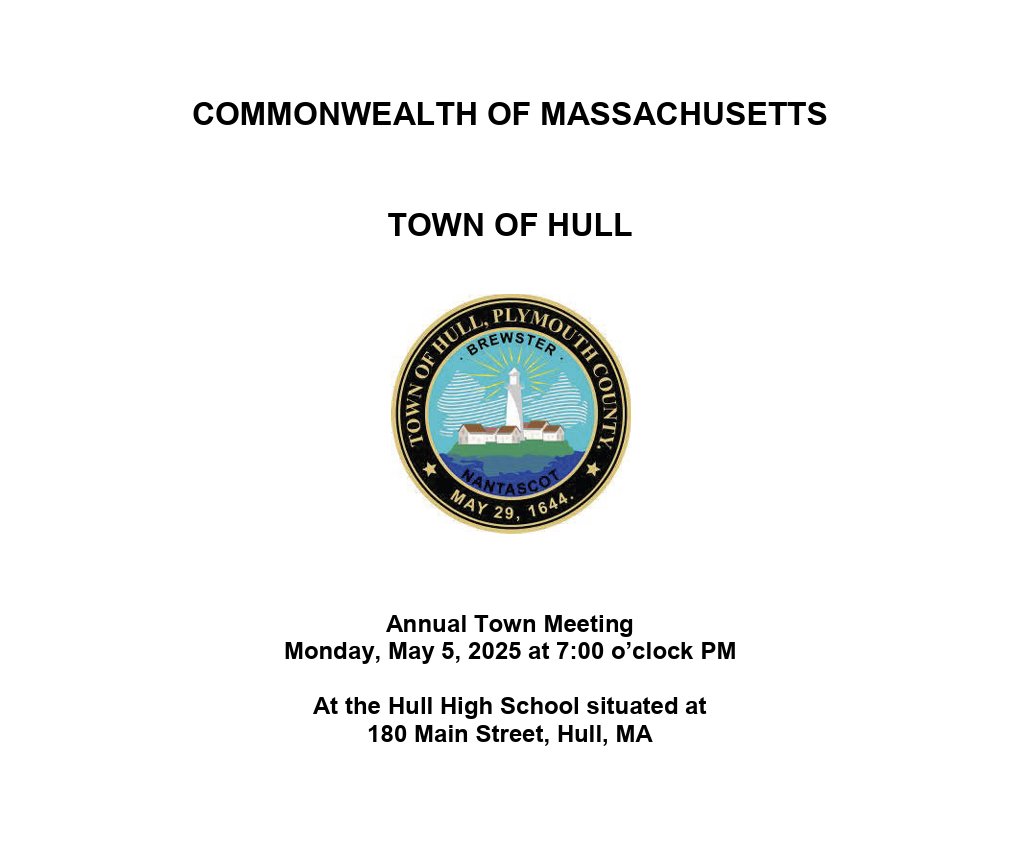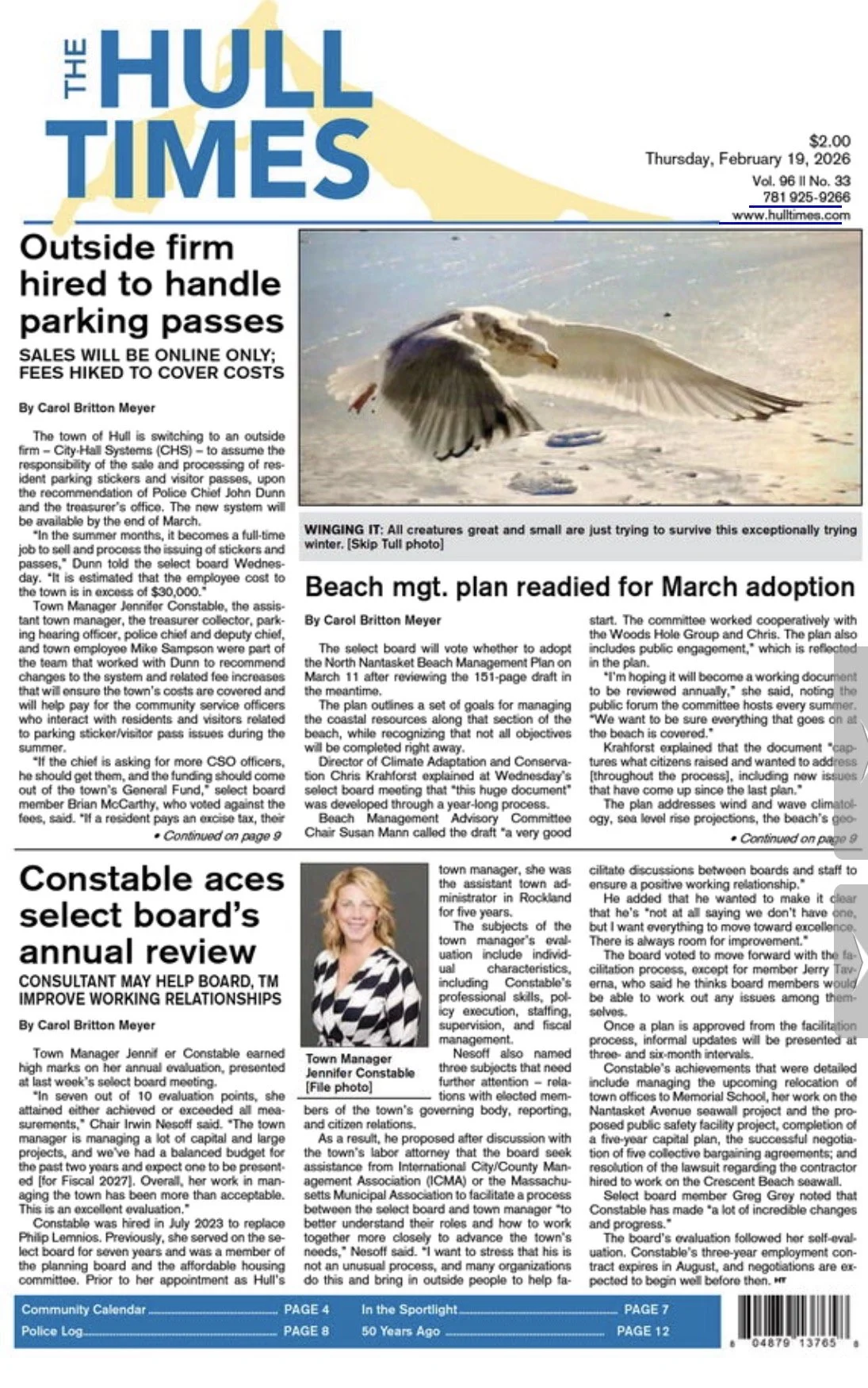Monday’s town meeting voters to tackle $52.6-million budget, Community Preservation projects, zoning, light plant changes
/By Christopher Haraden
On Monday night, voters will gather at Hull High School to begin work on a 42-article annual town meeting warrant, which features a $52.6-million budget plan for FY26, $1.06 million in Community Preservation projects, and several citizens’ petitions that would modify zoning, change the management structure of the light plant, raise the quorum required for town meetings, and increase the town’s room-occupancy tax.
The meeting is scheduled to begin at 7 p.m. In addition to conducting the town’s annual business, voters who attend can look forward to the Scouts bake sale, the Hull Boosters selling seat cushions, the HYT Food Truck (operated by Hy Tran, formerly of Dalat restaurant) outside the building to fuel the democratic process.
For the full text of each article, the advisory board’s recommendations, and a collection of news stories and opinion pieces about the issues on the warrant, visit the Times’ town meeting guide at www.hulltimes.com/town-meeting-2025.
Among the first acts of the assembly will be to act on the “consent agenda” – the standard housekeeping-type articles that must be approved each year in order to operate the government. The 12 articles in this year’s consent agenda, which are bundled into a single vote, range from acceptance of departmental reports to the reauthorization of enterprise funds to the payment of unpaid bills from the previous year. These articles are 1, 2, 3, 4, 5, 6, 9, 10, 11, 12, 14, and 22, and the town moderator’s message explains this process and how voters can modify the process if desired.
The town’s annual operating budget is Article 8. Earlier this year, Town Manager Jennifer Constable presented a proposed $52.6 million fiscal 2026 municipal budget, representing a 4.84%, or $2.4 million, increase over this year’s spending plan. Constable proposes to add two full-time fire department positions; a patrol and desk clerk position for the police department in her proposal.
Capital recommendations include IT system upgrades, town website improvements, new public safety vehicles, a columbarium at Hull Village Cemetery, repairs to the Draper Avenue sewer pump station, DPW barn and salt shed at West Corner. The budget also includes funds for local events to mark the United States’ 250th celebration.
For at least the third year in a row, there were no public comments during the annual public hearing on the proposed $18.4-million school department budget, which represents a 3% – or $535,643 – increase over the fiscal 2025 budget figure. Voters at town meeting will have the opportunity to ask questions of the school committee and superintendent at town meeting.
Click here for the votes taken on each article at the 2025 annual town meeting
The Community Preservation Committee’s seven projects for this year are included in Article 13. The committee proposes using the Community Preservation Act surcharge funds for a $530,000 redevelopment of Friend Park/Jones Park at Kingsley Road and Touraine Avenue; $137,500 to restore the Hull Lifesaving Museum Boathouse at Pemberton; $25,000 for a needs assessment of the town’s historic properties; $111,000 for painting and exterior lighting at the Hull Lifesaving Museum; $125,000 for roof replacement at the Paragon Carousel; $35,000 for exterior painting of the historic St. Nicholas United Methodist Church in Hull Village; and $100,000 for the preservation of historic town documents.
If Article 17 is approved, the select board could take three parcels of land on Beach Avenue by eminent domain. The town has said that the land seizures are necessary for maintaining the dune system on Nantasket Beach; numerous residents of Beach Avenue near the properties targeted in the article are opposed to the plan.
Voters will be asked to approve $17,960,000 to pay for upgrades and repairs to the sewer plant; the borrowed funds would be repaid through a 2.5% increase in sewer usage rates and a $120 per year hike in the base charge.
Article 25 would establish a Hull Community Trust Fund to develop affordable housing in town, while Article 28 modifies the town’s existing Accessory Dwelling Unit zoning bylaw to comply with the state’s standards, which were finalized after Hull adopted its bylaw.
Citizens’ petitions on the warrant include Article 32, which would rezone several properties bordering the Weir River – some publicly owned, some in the hands of private citizens – to public open space.
Article 33 would require new multi-family projects of four or more units to be 100% affordable as a way to encourage the construction of lower-cost housing in town. Article 36 would repeal the Flexible Plan Development bylaw, which applies to multi-family and commercial projects of 10 acres or more, such as future development on the Hull Redevelopment Authority property.
Article 37, which is discussed extensively in the Times’ letters to the editor section, would remove the town manager as the light plant manager and return the public utility to the management structure it operated under since its founding in the late 1800s through 1993, when voters agreed to put the town manager in charge.
Article 38 would increase the quorum of voters required for town meetings from zero to 150, while Articles 39, 40, 41, and 42 would increase the room occupancy excise taxes from 4% to 6% and impose an impact fee of 3% on professionally managed short-term rentals. These proposals have the support of the advisory board as an additional source of revenue for the town.
Like what you’re reading? Stay informed and support our work with a Hull Times subscription by clicking here.
Do you have an opinion to share? Click here to write a Letter to the Editor.
© 2025 The Hull Times. All rights reserved.









